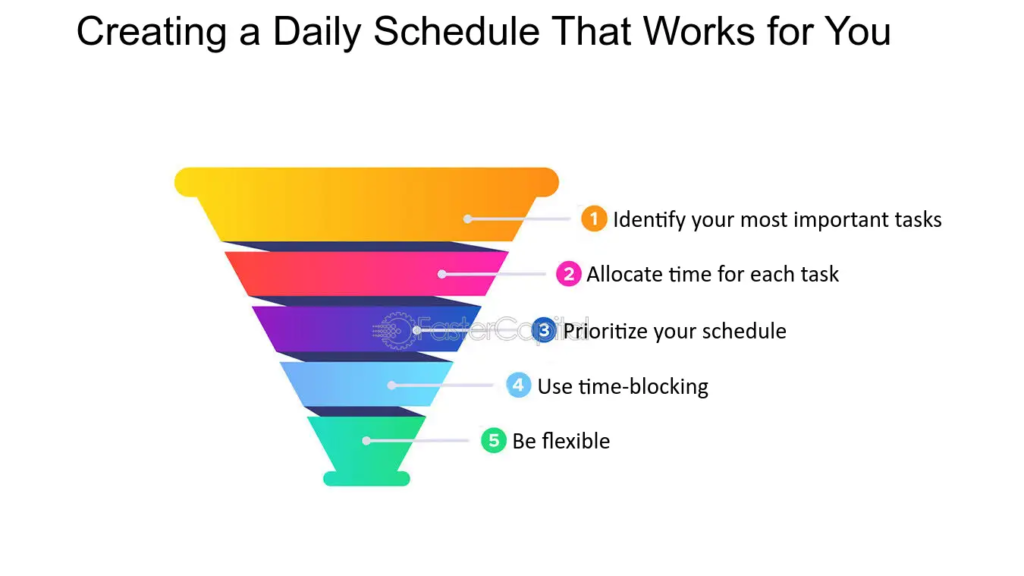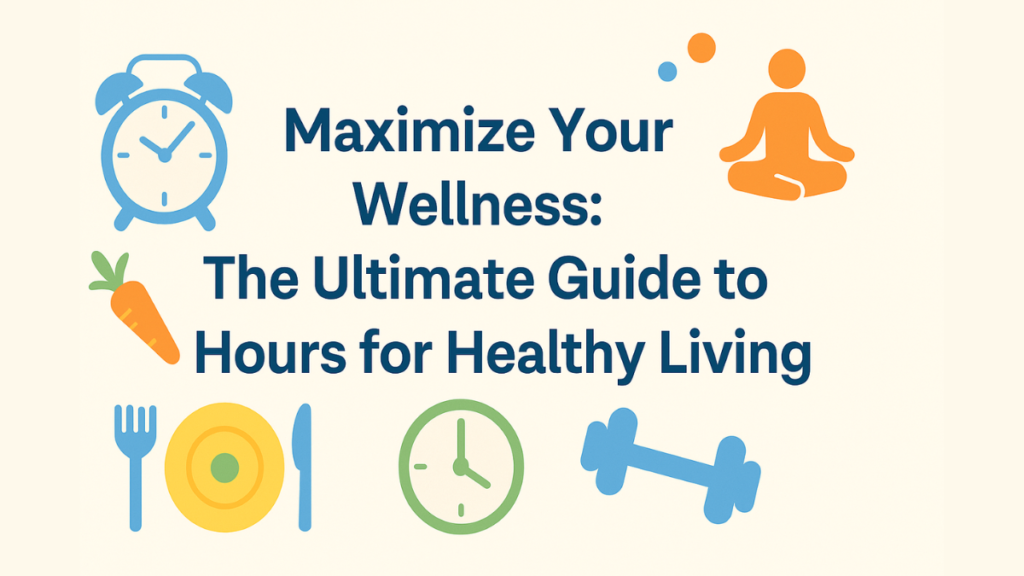Discover how to maximize your wellness with the ultimate guide to hours for healthy living. Learn the best daily routines, tips, and schedules for optimal health and balance.
also read:https://babessproduct.com/innovations-in-dry-eye-treatment-whats-new-in-the-market/
Introduction: Why Hours Matter for a Healthy Life
Living a healthy lifestyle isn’t just about what you eat or how often you exercise—it’s also about how you manage your time. The way we spend our hours each day can directly impact our physical, mental, and emotional well-being. Whether it’s getting enough sleep, staying active, or taking time to relax, understanding the importance of each hour is essential to living a balanced life.
In this guide, we’ll explore how to maximize your wellness by structuring your daily routine in a way that supports healthy living. We’ll break down each part of the day, offer research-backed advice, and give you tools to make positive changes to your lifestyle.
The Science Behind Daily Hours and Wellness

Circadian Rhythms and Your Body Clock
Your body operates on a 24-hour internal clock known as the circadian rhythm. This rhythm helps regulate sleep-wake cycles, hormone release, digestion, and body temperature. Aligning your daily habits with your natural rhythm enhances your energy, mood, and overall wellness.
For example:
- Morning hours are best for productivity and physical activity.
- Afternoon is ideal for focused mental work.
- Evening should be for winding down and preparing for rest.
Morning Hours – Start Strong (5 AM to 9 AM)
Your morning sets the tone for the entire day. Waking up early can improve mental clarity and productivity. A structured morning routine can include:
- Hydration – Drink a glass of water as soon as you wake up.
- Movement – A 20–30 minute walk or stretch session boosts energy and metabolism.
- Mindfulness – Meditation or journaling reduces stress and improves focus.
- Nutrition – A protein-rich breakfast supports brain function and reduces mid-morning cravings.
Benefits of Early Rising
Research suggests that people who wake up early are more proactive, optimistic, and better at anticipating problems. If you’re not naturally a morning person, gradually adjust your sleep schedule to ease into an earlier wake-up time.
Midday Hours – Stay Energized (9 AM to 3 PM)
This is when most people tackle work, school, or household tasks. However, energy levels tend to dip after lunch. To stay on top of your game:
- Schedule complex tasks during peak brain hours (9 AM–12 PM).
- Take short breaks every 60–90 minutes to improve productivity.
- Eat a balanced lunch with fiber, healthy fats, and lean proteins.
- Hydrate regularly to maintain focus and prevent fatigue.
Table: Midday Productivity Tips
| Time | Activity Type | Reason |
|---|---|---|
| 9 AM–12 PM | Deep work | Peak focus and energy |
| 12 PM | Lunch + break | Refuel and reset mentally |
| 1–3 PM | Light tasks or meetings | Natural energy dip, less intense work |
Evening Hours – Wind Down Right (3 PM to 8 PM)
As the day slows down, your wellness routine should shift towards restoration. It’s crucial to end your day intentionally so you can sleep better and recharge fully.
Ideal Evening Wellness Activities
- Light physical activity like yoga or walking helps reduce cortisol levels.
- A healthy dinner eaten before 7 PM supports digestion and sleep.
- Quality time with loved ones boosts emotional well-being.
- Unplug from screens at least 1 hour before bed.
Spending this time away from high-stimulation tasks can significantly improve sleep quality and reduce stress.
Night Hours – Restore and Repair (8 PM to 5 AM)
Sleep is your body’s built-in repair system. Most adults need between 7 to 9 hours of sleep per night. Consistent rest improves memory, metabolism, immune function, and emotional resilience.
How to Improve Sleep Hours
- Maintain a fixed sleep schedule, even on weekends.
- Create a calming bedtime routine—reading, meditation, or a warm bath.
- Keep your bedroom cool and dark to enhance melatonin production.
- Avoid caffeine and heavy meals 3–4 hours before bed.
Sample Healthy Living Daily Schedule
Here’s a sample schedule designed to help you maximize your wellness by aligning with your natural energy cycles:
| Time | Activity |
|---|---|
| 5:30 AM | Wake up + hydrate |
| 6:00 AM | Light exercise or yoga |
| 6:30 AM | Meditation or journaling |
| 7:00 AM | Healthy breakfast |
| 9:00 AM | Focused work or study |
| 12:00 PM | Lunch + short walk |
| 1:00 PM | Emails or light admin tasks |
| 3:00 PM | Short break + healthy snack |
| 4:00 PM | Light workout or hobbies |
| 6:00 PM | Dinner + family time |
| 8:00 PM | Wind down: reading, bath, etc. |
| 9:30 PM | Sleep |
Tips to Maximize Every Hour of the Day
To truly maximize your wellness, you don’t need a perfect routine—just a consistent one. Here are some tips for staying consistent and flexible:

- Set small, achievable goals to build momentum.
- Track your time weekly to spot where energy is being wasted.
- Use reminders or planners to establish new habits.
- Be kind to yourself if you miss a day—consistency matters more than perfection.
Common Time Management Pitfalls to Avoid
Even the best wellness intentions can be derailed by time-wasters. Here are common traps:
- Multitasking too much, which reduces overall efficiency.
- Skipping breaks, leading to burnout.
- Ignoring sleep needs for work or entertainment.
- Over-scheduling, leaving no room for relaxation.
Awareness is the first step to change. Identify which habits are holding you back and adjust them gradually.
FAQs: Maximize Your Wellness with Healthy Living Hours
- How many hours should I sleep for optimal wellness?
Adults typically need 7–9 hours of quality sleep per night to feel and function at their best. - What is the best time to work out for wellness?
Morning workouts can boost energy, but afternoon and evening exercise can also be effective—consistency matters most. - Can naps be part of a healthy schedule?
Yes, a 15–30 minute nap in the early afternoon can improve alertness and mood without affecting nighttime sleep. - How do I manage wellness with a night shift job?
Prioritize daytime sleep, use blackout curtains, and stay consistent with your sleep schedule—even on days off. - Is it okay to skip breakfast if I’m not hungry?
It depends—some people thrive with intermittent fasting, but a balanced morning meal can support energy and metabolism. - What is the best time to eat dinner for healthy living?
Ideally, eat dinner 2–3 hours before bed to aid digestion and improve sleep quality. - How can I balance work and wellness hours?
Use time-blocking techniques to allocate hours for both work tasks and wellness activities like movement and mindfulness. - How much screen time is too much in a day?
Aim to limit recreational screen time to under 2 hours and take frequent breaks from screens during work. - Should I stick to the same routine on weekends?
Keeping a similar wake/sleep schedule on weekends helps maintain circadian rhythm and energy balance. - What’s a realistic first step to creating a healthy daily schedule?
Start with just one habit—like a regular sleep time—and build from there over a few weeks.
Conclusion: Create Your Personalized Wellness Routine
Maximizing your wellness is all about how you use the hours in your day. By creating a routine that supports your physical and mental health—and aligns with your body’s natural rhythm—you can lead a more energized, focused, and fulfilling life.
Whether you’re a busy professional, a parent, or someone seeking better balance, using your time wisely will bring noticeable benefits. Start small, stay consistent, and make time your ally in achieving a healthier lifestyle.
also read: https://babessproduct.com/can-neurologists-help-with-sleep-disorders/
also read: https://babessproduct.com/can-spinal-decompression-help-avoid-surgery/

